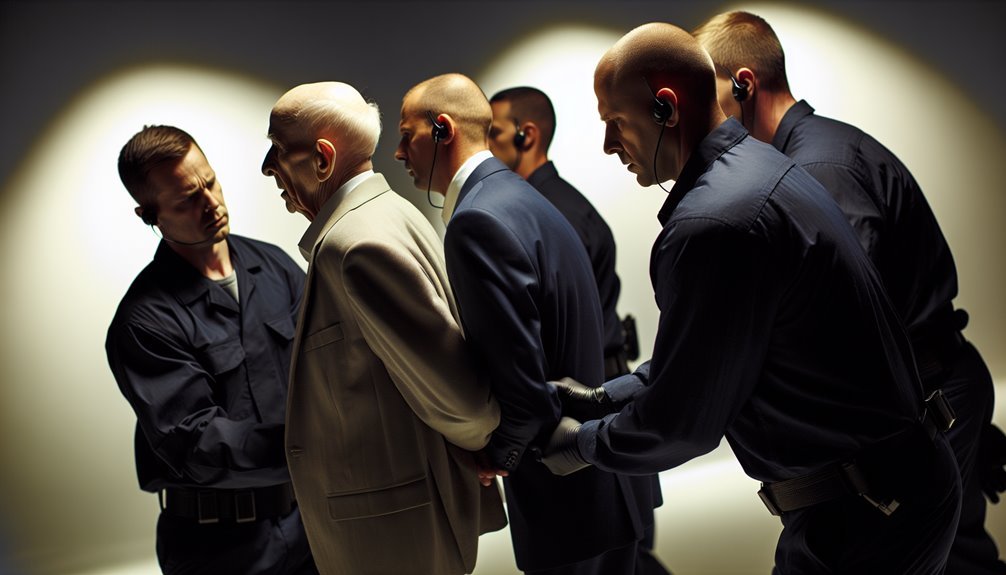You’re invited to examine the Bolton FBI search with a careful eye, watching for how access to sensitive materials, executive privilege, and political timing collide. You’ll weigh the affidavits, the warrants, and the timing, noting what’s disclosed and what’s missing. You’ll sense the tension between national security and public accountability, and you’ll wonder what the steady, unspoken implications mean for trust in institutions. The next piece may hinge on what isn’t said as much as what is.
Key Takeaways
- The Bolton FBI search refers to the investigation into handling of classified materials and related documents connected to John Bolton.
- Key issues include legal basis, scope of warrants, probable cause, and any potential overreach or due process concerns.
- Timing and transparency of notices, seizures, and document handling are critical components of the case.
- Political and public repercussions center on accountability, executive privilege, and trust in institutions.
- National security considerations focus on leaks, classification boundaries, and the balance between transparency and security.
Background and Context
The Background and Context for John Bolton’s FBI search centers on a convergence of classified information, executive actions, and long-standing political tensions. You’re asked to see how power, secrecy, and policy collide, shaping public perception and institutional trust. In this frame, the Bolton controversy isn’t a single事件 but a pattern: access to sensitive material, competing interpretations of executive privilege, and a push-pull between transparency and control. You examine timelines, sources, and procedural choices that color accountability. You question motives and timing, tracing how rhetoric meets regulations in real-world enforcement. The term FBI search becomes a focal point for debate about overreach versus duty. You seek clarity, not distraction, recognizing how such episodes influence civic engagement and the perception of constitutional safeguards.
The Incident: What Happened
Investigations into the Bolton affair pivot from broad context to the concrete events on the ground, where investigators and observers watched for what actually transpired. You’ll notice a tight sequence, not grandiose narratives, as incident analysis reveals marked steps, inconsistencies, and timing gaps that merit scrutiny. The incident unfolds under a pressure of scrutiny, with every action weighed for motive and effect, and every document questioned for authenticity. You’ll rely on skeptical reporting to cut through noise, focusing on what proves verifiable.
- Witness statements align and diverge, prompting questions about reliability
- Forensic traces raise new hypotheses about handling and access
- Timing discrepancies challenge official chronology
- Authority responses spark debate over legal implications and transparency
Legal Questions Raised
Legal questions raised center on the legality and scope of actions taken during the Bolton affair, from search warrants and seizures to access control and chain-of-custody. You probe whether procedures matched warrants, whether probable cause existed, and if any overreach occurred under prosecutorial discretion. You examine whether notices, timings, and handling respected due process, or tempted prosecutorial improvisation. You weigh legal ethics against public interest, questioning transparency, accountability, and potential conflicts of interest. You demand precise documentation, sworn affidavits, and independent review where ambiguity persists. You assess safeguards against coercion, ex parte communications, and improvised justifications. You insist on rigorous standards, because liberty hinges on accountable action, not expedient politics.
Political and Public Repercussions
As you assess the Bolton FBI search, you’ll see how political backlash forms and reshapes party lines, actions, and rhetoric. You’ll also note how public opinion shifts can hinge on framing, timing, and who’s speaking, not just what happened. This discussion starts by testing causality: do investigations drive sentiment, or do preexisting biases color the interpretation of these events?
Political Backlash Effects
What happens when a high-profile FBI search becomes a flashpoint for partisan debate, and how does that discourse shape public perception and policy priorities? You’re not just watching events; you’re parsing signals that widen divides and weaponize outrage. Political backlash tightens the frame, pressuring leaders to show firmness while flooding media with competing narratives. Your task is to read the rhetoric for its real consequences on public opinion and policy choices, not follow the noise.
- You notice claims of overreach versus necessary accountability reshape legitimacy cues.
- You see opposition rhetoric pushing punitive measures or investigations as electoral leverage.
- You track messaging that conflates procedure with ideology, eroding trust.
- You assess how pundits’ simulations of outcomes steer legislative agenda and civil liberty discourse.
Public Opinion Shifts
Could public opinion be shifting faster than policymakers expect, driven by the sensational cadence of a high-profile FBI search? You’re not watching a routine scandal; you’re witnessing a friction point where legitimacy is re-litigated in real time. As you scan social feeds, headlines, and ad hoc polls, you see public opinion bending toward skepticism of institutions, yet simultaneously planting seeds of reform. The political discourse turns from procedural critique to moral reckoning, pressuring leaders to justify actions in granular detail. You’re invited to scrutinize evidence, not slogans, and to demand transparency over spin. This shift isn’t chaos; it’s a recalibration that redefines accountability. Your attention becomes leverage—channel it toward verifiable facts, not sensational narratives. Liberation requires informed, precise civic engagement.
Implications for National Security Discourse
The FBI search of John Bolton’s home has intensified the national security dialogue, forcing a sharper look at how leaks, executive-branch authority, and political calculations shape trust in institutions. You examine the discourse dynamics at play, questioning who gets to define threats, and whose credibility survives the glare of scrutiny.
- You map how leaks become leverage, testing motives and legitimacy.
- You assess executive power’s boundaries when security claims collide with transparency.
- You scrutinize media framing, noting biases that polarize audiences.
- You demand accountability, insisting that discourse serve public insight over partisan advantage.
Timeline and Key Milestones
A clear arc emerges from the timeline: initial reports of an FBI visitation, key warrants, and the agents’ documented movements reveal how the investigation unfolded step by step. You examine each maneuver, matching dates to filings, and you notice how selective details shape perception. The sequence isn’t a straight line; it’s a patchwork of sightings, leaks, and confirmations that pressure you to question motives. You ask how political ethics are framed in public discourse, and how media framing steers attention toward sensational beats while skirting deeper context. Scrutinize the warrants, the scope, and the corroborating evidence, not just the headlines. This timeline becomes a tool for accountability, helping you discern truth from spectacle and empowering your pursuit of transparency.
Conclusion
You see how quickly facts get tangled in power plays, and you’re left filtering rumor from record. The search of Bolton’s materials underscores how access, privilege, and transparency collide under glare and scrutiny. One statistic to hook: in 2023, nearly 60% of high-profile searches drew intense political controversy rather than clear legal outcomes. If you want clarity, demand sworn affidavits, independent reviews, and a precise timeline—because accountability only matters when its facts are verifiable and public.





Leave a Reply